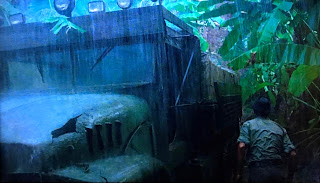"It's kind of messed up to rob a blind guy."
Director Fede Alvarez' Don't Breathe (2016) is my kind of American horror film. It's high on tension and suspense and dramatic thrills and low on gore. Fans of the torture porn variety will be sorely disappointed here. Don't stop here.



As I get older myself part of the problem is I just don't have the stomach for horror, but Don't Breathe is just a straight up, tight, gripping little thriller. Though it's not without violence.
It's a picture that seems perfect for these morally ambiguous times surrounding the year of its release.
The director, the man behind the latest girl with the dragon tattoo story (The Girl In The Spider's Web), took a good deal of pride in painting his characters with both good and bad qualities. Who you would root for rested entirely with your interpretation of their motivations. At least that's the approach.

Of the four characters, the blind man and the female lead have the most background to suggest their situations are complicated and murky.

Though, for fear of coming off a curmudgeon or old school, let's be clear, these are generally bad people or at least compromised people forced into making some very, very bad and criminal decisions. There are no two ways about it. While I was sympathetic to both the blind man and the female lead, yes I was at once concerned for them and repulsed by them, these people are doing terrible things. In that I cared for these characters a bit Alvarez succeeds. But these are generally corrupted people doing very bad things and it must be said, because there is no way this writer would excuse their behaviors in any way, shape or form, regardless their circumstances. So long as you can draw breath there are other options.

Performances by Stephen Lang (the blind man) and Jane Levy (Evil Dead) and others are solid and extremely physical. The production design created for the house, the focus of the shooting for the film, is also quite spectacular and creepy in its own right.

I'm not normally inclined to write about horror pictures, but in the spirit of Halloween and given today is the day (October 31st) it seemed a good fright picture should be recommended here at Cinematic Wonders. For me, Don't Breathe wins the day. This is a great, taut, judiciously edited little thriller worth breathing in for 90 minutes after the trick and treating is over and Michael Myers is captured.
Don't Breathe subverts conventions and defies traditional genre expectations that tend to get stale and generate those ruts.

Home invasion stories are a wonderful subgenre and ideas like Hostage (2005) and David Fincher's Panic Room (2002) pit the innocent against the villains. Alvarez turns the tables and asks us to wonder who is who.
This is ferocious, primal human nature at its worst and yet the film profits from the idea that less is more and it's all the better for it. See the film, and despite the directive, don't forget to breathe when you do.

Don't Breathe. Director: Fede Alvarez. Writer: Fede Alvarez/ Rodo Sayagues.



















































